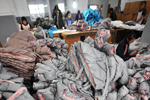Wen vows to speed up fiscal, financial reforms
Updated: 2012-02-16 10:45
By Wei Tian (China Daily)
|
|||||||||
BEIJING - Premier Wen Jiabao vowed on Wednesday to speed up the pace of fiscal and financial reform this year to guarantee steady growth amid global and domestic uncertainties.
The government will improve the fiscal payments transfer system and ensure funding mechanisms at the county level, Wen said.
He said the government would also pursue an expansion of valued-added tax reform, as well as the comprehensive reform of the resource tax system.
Wen made his comments at a meeting of the State Council, or China's cabinet.
He called for stronger risk management in State-owned financial institutions and the development of small financial institutions to support small and medium-sized enterprises and agriculture.
He also called for "reasonable guidance" for private financing to promote the sound development of a multi-level capital market.
Fiscal reform has moved back into the spotlight, as last year's tax revenue surged to a record high even as economic growth cooled.
According to the Ministry of Finance, total tax revenues rose 22.6 percent to 8.97 trillion yuan ($1.42 trillion) in 2011.
The full-year growth rate was flat with that of 2010. But the pace of growth declined from 32.4 percent in the first quarter to 6.8 percent in the final three months.
The ministry said the deceleration in growth as the year progressed was caused by slowing economic activity, as well as tax cuts, a softening in the vehicle and property sectors and losses in the oil refining industry.
China lowered businesses' tax burdens last year by cutting import tariffs on energy and raw materials and raising the thresholds on value-added taxes and turnover taxes.
Personal income tax revenue slid 5.5 percent year-on-year in the fourth quarter after the government raised the tax threshold in September.
But full-year revenue from personal income taxes still expanded by 25.2 percent.
The impact of the personal income-tax cut was apparently offset by higher wages, said Li Wenhai, an expert on fiscal policy at Renmin University of China.
Li noted that on average, wages went up 13 percent last year to compensate for inflation.
Li said that revenue growth from the corporate income tax and sales tax was likely to "significantly decrease" this year, because tax cuts focused on those areas.
Corporate income tax revenue surged 30.5 percent year-on-year in 2011 to reach 1.68 trillion yuan, accounting for 18.7 percent of total tax revenues.
Resource tax income was up 43.4 percent to 59.9 billion yuan, a growth rate that was 19.9 percentage points higher than in 2010, as the nation carried out reforms in this area of taxation.
"Tax revenue growth in 2012 is expected to be lower than last year because there are more structural tax cuts planned," said Ni Hongri, a researcher with the State Council's Development Research Center.
"But implementation of these tax cuts is likely to face resistance from local governments, which must deal with declining fiscal revenues and increasing expenditures," Ni said.
Related Stories
Premier Wen Jiabao inspects Guangdong Province 2011-10-17 11:57
Wen Jiabao promet de renforcer les relations avec la Malaisie 2011-04-21 10:26
Full text of Chinese premier Wen Jiabao's speech at Balai Kartini of Indonesia 2011-05-01 13:49
Wen Jiabao in Europe – foundations of a 'win-win' relationship 2011-06-27 11:53
- Alibaba seeks Yahoo CEO after talks: insider
- Experts: EU statement opens door to status
- Assembling ideas for Ikeas in China
- Investment 'will continue'
- PBOC sets 14% target for money supply growth rate
- Firm broke trademark deal: Apple
- Soft landing on the horizon
- Urbanization to engine China's economy









